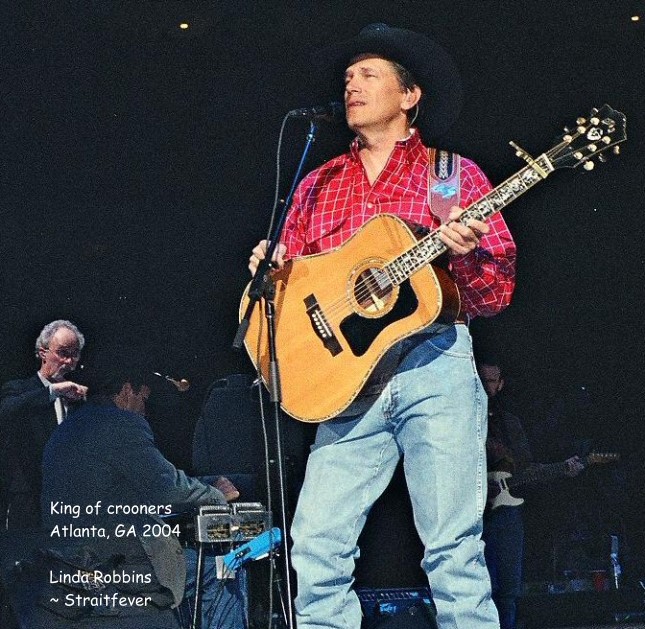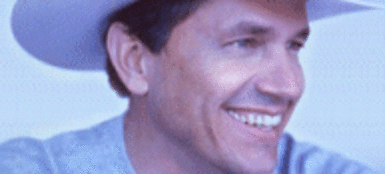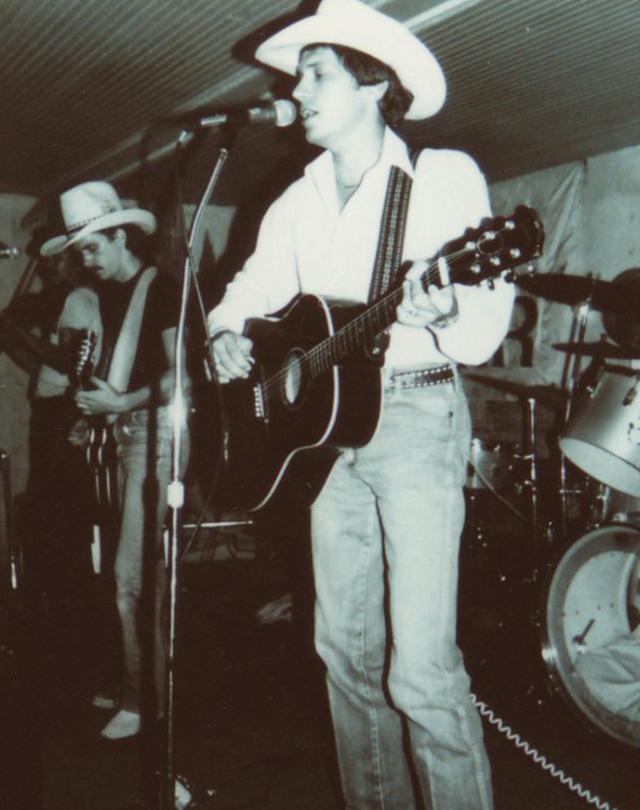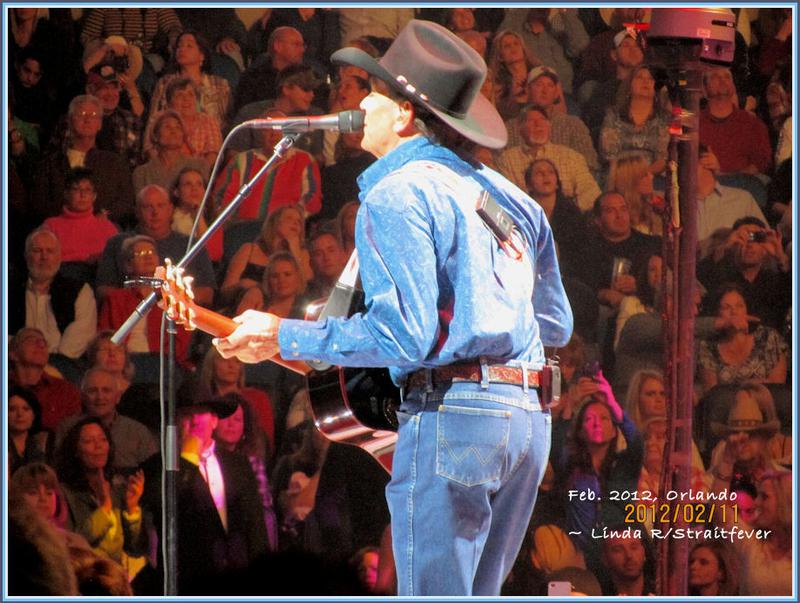The date: Oct. 13, 1975. The place: a San Marcos, Texas, hole in the wall called Cheatham Street Warehouse. The Stoney Ridge Band, fired by their previous frontman, is about to debut under a new name. Center stage is a new guitar-playing baritone who happened to see the "Singer Wanted!" posters the band had tacked up around the Southwest Texas State University campus they all attended. Seemed like a good match.
Thirty-three years and a record-tying 55 No. 1 country hits later, George Strait and the Ace in the Hole Band still seem like a pretty good match. Along the way, the band has segued from the Ace in the Hole Band to the Ace in the Hole Band Featuring George Strait to George Strait and the Ace in the Hole Band. It's the same core players, minus one who took another job in the organization and a guitar player who died. Loyalty -- both ways -- is a George Strait tradition.
Kent Finlay still owns that Texas warehouse where the stage lighting consisted pretty much of a bare bulb and the sound system was whatever the gigging bands brought with them. Those acts included a teenage guitar whiz named Stevie Vaughn (who hadn't yet added his middle name, Ray, to his stage moniker), country outlaws Willie Nelson and Jerry Jeff Walker, a keeper of the Bob Wills legacy called Asleep at the Wheel, and Texas' best-kept secret, a singing train wreck of a poet named Billy Joe Shaver.
Finlay remembered that particular October day and the man in the cowboy hat onstage. The band didn't have any sound equipment of its own, so he borrowed his.
Though decidedly less polished, Strait circa 1975 was much as he will be when he takes The Q stage for another sold-out show Saturday: quiet, determined and gifted. Ticket prices back then were a little cheaper, though.
The band was trying to drum up support for its new lineup and had posted fliers inviting people to their free "coming out" party. Worked, too. Finlay said the Ace in the Hole Band played more than 50 shows at the club, which is still going strong.
Baritone attracts attention early
In 1975, George Strait was 23 years old. He'd spent a couple of years in the Army and was only a semester shy of graduating from what is now Texas State University-San Marcos. He was paying his way through school with help from the GI Bill and money he made managing a ranch outside San Marcos.
He was married to the woman who still wears his ring, Norma Strait. Their first child, Jennifer, whom they would lose in a tragic auto accident when she was 13, was in diapers.
"I told people for years he was going to be a star," Finlay, a musician and a club owner, drawled during a phone conversation from his Texas home. Every time he sees Strait, Finlay said he "thanks him for not making a liar out of me."
In those days, Strait and the Ace in the Hole Band did what bar bands do: cover proven artists. For a real cowboy like Strait, that meant poets like Merle Haggard and fellow Lone Star Staters George Jones and Bob Wills, the father of Texas swing music. You still hear those influences in his voice.
Strait doesn't have the San Quentin prison-yard scrabble of the Hag's delivery or the human pedal steel sound of the Possum, but like them, his voice drips sincerity. Wills' captivating two-step bounce is clearly evident, too, especially in Strait hits such as the early "The Fireman" and later efforts "Blue Clear Sky" and "Give It Away."
Ted Stubblefield, who played drums for Finlay's own High Cotton Express band, was drafted to bang away for the Ace in the Hole Band in that opening salvo. He was filling in for Tommy Foote, the original Stoney Ridge drummer, who'd decided he needed to grow up and make a living and went home to Houston.
But band members lobbied Foote to return and listen to Strait. And once he heard the smooth baritone, Foote was hooked. In January 1976, he rejoined the band. Six years later, he put away his sticks and took over as road manager. It's a job he's held ever since.
"The first time I heard him sing, I knew that man was my first real chance to go somewhere in the music business," Foote said from his home outside San Antonio.
But it's the "real" in Strait that's made him a survivor in a business filled with drugstore cowboys and people out for a quick buck.
"George is 100 percent honest and sincere," said Ben Farrell, a longtime friend and concert promoter. Cleveland baseball fans might remember Farrell: His father, Kerby, managed the 1957 Tribe. Ben Farrell spent a lot of his childhood on the field at the old Municipal Stadium, an awestruck boy around stars like Bob Feller and Herb Score.
"George is a family man, a man's man," Farrell said. When he's not recording or touring, Strait spends time on his ranch outside San Antonio, and has hands "like leather from rope burns" from a lifetime of working with horses and cattle.
But calluses won't keep you on top of the music business for three decades.
Foote said "It was clear from the start that Strait was coming from a different perspective. A lot of people don't have a clue what it takes to succeed in music. But Strait's focus, his attention to detail, his insistence on getting things right (and his ability to do so while remaining "one of the guys") show that he does. It's paid off in spades -- and dollars."
In all, Strait has had 76 songs climb into country's Top 10 charts since his first hit, "Unwound," was released in 1981. Two new songs, a duet with Kenny Chesney called "Shiftwork" and a single called "I Saw God Today," could raise that number. If the latter goes all the way to No. 1, he will set the all-time country record for No. 1 songs by a solo artist with 56, passing one of his own heroes, Conway Twitty.
"Hardly anybody out there now has the mystique and charisma that he's held onto," said Farrell, who compared Strait's magic with a crowd to that of Elvis Presley in his prime -- a comparison often made between Twitty and Presley during Twitty's heyday.
Family man to his core
Strait has always been reluctant to do press interviews, a trait that has added to his mystique. Some say that it was daughter Jennifer's death in 1986 that led him to shun the media. The national press at the time was unmerciful, as was a prosecuting attorney who Finlay said was trying to make a name for himself.
"She was 13 and came to him and said, 'Daddy, can I go to Sonic?' And he said, 'Yes, but be careful,' " Finlay recalled. The boy driving was going a little too fast, and, when he came to a T-intersection in a place in San Marcos that had been the site of several previous accidents, he couldn't make the turn.
His Ford Mustang rolled, and Jennifer was partially thrown from the car. She was pronounced dead at the scene. The driver was unhurt; paramedics treated two other teens who were sent home.
Despite Finlay's recollection of those tragic events 22 years ago, San Marcos Record newspaper accounts of the incident said the teens were coming from a party, but that no alcohol was involved. The 18-year-old driving was charged with criminally negligent homicide in an indictment that was later quashed after defense attorneys accused the prosecutor of misconduct.
"George called the boy when the district attorney started trying to charge him with negligence or something," Finlay said. "George told him it was just an accident. They were just kids going to Sonic for a Coke."
Few fathers could be so understanding, especially those as devoted to their children as Strait was to Jennifer and is to son George Jr. In a way, it's a fitting barometer of the man. He won't place blame where it doesn't belong.
Foote and Farrell said the accident doesn't have much to do with Strait's reclusive nature.
"He's just very consistent, very private," said Foote.
"It's odd, really, that a man that private can share so much of himself onstage. But there is a palpable connection with the audience when he walks into the arena."
Strait doesn't get into histrionics: leaping from speakers, climbing guy wires or rattling off one-liners. He doesn't resort to theatrics like confetti cannons and flag-waving color guards. It's all about the music.
The stage at a Strait show is in the middle of the arena. He sets up four microphones at each corner of the diamond-shaped stage. He sings a couple of songs at one, then ambles to the next, the next and the next, usually grinning ruefully between tunes and mouthing silent "thank you's." His most acrobatic move might be to adjust the capo on his guitar neck.
But from the instant his distinctive, pure country baritone soars above the curtain-raising applause, he's got the crowd in his grip, roped and lassoed like a wayward calf.
"My God," an admiring young Garth Brooks once told Farrell while watching offstage during a 1989 or 1990 show. "I have seen men who were self-contained, but he goes too far."
"Perhaps. But he's not done -- not by a long shot, said Foote. "
"He still enjoys making albums, going on tour and rising to the top of the charts. It's his competitive cowboy nature."
~And we're all still along for the ride. ~ Linda/Straitfever
A real cowboy, George Strait still lets his musical talent do the talking
by Chuck Yarborough/Plain Dealer Reporter
Date released: Saturday February 23, 2008, 12:00 AM
I felt this was a worthy article, an honest insight to George Strait, the man. With the history of the conversation from those who know George well this article is worth keeping, sharing, and re-reading.
There is more to the man then the music.
~ Linda Robbins
o add text.
This page was last updated: February 28, 2022
Return to Straitfever Website --
1979
Double click here to add text.
Double Ge George here to add text.
Double click here to add text.





